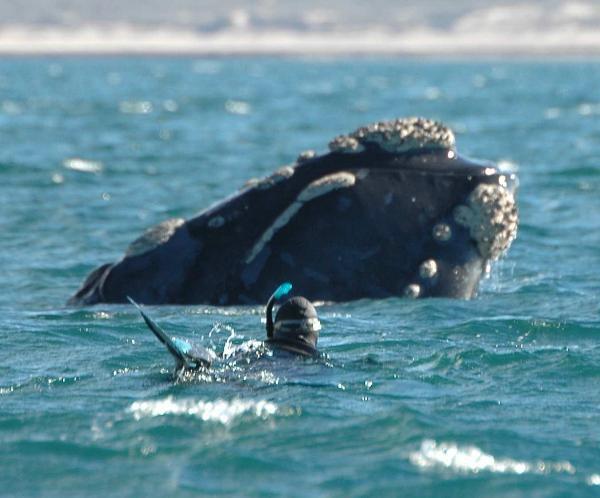Els Vermeulen
Other projects
20 Jul 2010
Project Right Whale – Evaluating the Impact of Touristic Activities on Southern Right Whales in North Patagonia II
This project aims to obtain information on the southern right whales in the Natural Protected Area Bahía de San Antonio, Northeast Patagonia, allowing us to understand the impact of “swim-with-whales” and “whale-watching” activities conducted in this area. The results of this project will be an indispensable tool for the implementation of accurate regulations and conservation measurements towards these vulnerable animals in the region.

The only location in Argentina, and one of the only places in the world, where it is legal to swim with southern right whales, is inside the Gulf of San Matías, Province of Río Negro. The effect of tourism based on cetaceans has been the aim of several workshops in the last years pointing out that there is a great individual variety of responses within and among cetacean species. It was therefore recommended that one should evaluate in each case and species the biggest quantity of possible impact factors (IWC, 1986). The most common form of whale-tourism is boat-based (Hoyt, 2001), although swimming with cetaceans is increasing worldwide as e.g. in the province of Río Negro, Argentina. Considering the possible consequences of swim-with-whales activities, it is highly necessary to create an accurate management strategy in this region, but such a strategy requires in turn the urgent understanding of various ecological and behavioural aspects of the whales visiting the area.
We therefore aim, with this project, to obtain information on the southern right whales in the Natural Protected Area Bahía de San Antonio, the foremost important touristic region of the coast of the Río Negro province. We will determine the amount of southern right whales visiting this region, their sighting frequency, group size and structure and their behaviour (habitat use) in this area. Besides the normal, undisturbed behaviour, we will asses the whale’s reaction to human approaches. We will evaluate if the behavioural patters are distorted by human interactions (boats and swimmers) and to what extend, and whether or not the whale group composition is related to their reaction on tourist boats and/or swimmers. Furthermore we will determine if the primary reaction of the whale to the human approach can serve as a predictor of the overall impact on their behaviour.
With this study, we aim to obtain the fundamental data needed for the creation of accurate management plans and conservation measurements for southern right whales in Northeast Patagonia and to commence with local environmental education programs, this way collaborating in a responsible and sustainable development of the area and ensuring the conservation of its natural resources.